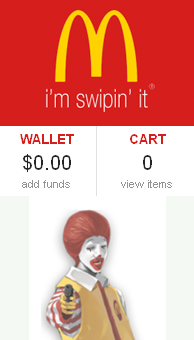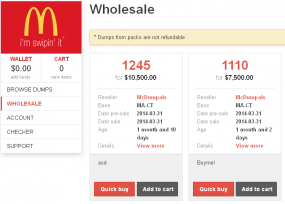Track 101 201 US DUMPS
$185.00
This is digital listing! High quality US dumps with PINs. Got almost all banks and countries but for additional price. For this listing we replace decline and do not honor card response. Lux quality goods. You can buy directly from our shop or contact us to make an order. If you need 5 pcs, add 5 items to your cart and check out. $185 for high balance track 1and track 2 data sent to your email.
CONTACT US FOR PURCHASE/INQUIRIES, WE RESPOND ALMOST INSTANTLY :
EMAIL: dumpsbuymartinoo@gmail.com
TELEGRAM: @martindumps CLICK HERE
WHATSAPP: CLICK HERE
ICQ: martinoo CLICK HERE
JOIN OUR TELEGRAM CHANNEL TO GET UPDATES, WE SHARE FREE DOCUMENTS LIKE PASSPORT, SSN SCAN FULLZ, DAILY DATABASE DUMPS, LATEST TOOLS, TIPS AND TRICKS.
CLICK HERE TO BUY CLEAN CASHAPP TRANSFERS
Description
Price for Dumps with Pin, Track 1/2 :
– Dumps with Pin, Track 1/2 ( ) : $180 / 1pcs
– Dumps with Pin, Track 1/2 ( UK ) : $200 / 1pcs
– Dumps with Pin, Track 1/2 ( CA ) : $200 / 1pcs
– Dumps with Pin, Track 1/2 ( AU & EU ) : $180 / 1pcs
– Dumps with Pin, Track 1/2 ( China ) : $200/ 1pcs
Price for Dumps without Pin, Track 1/2 :
* Dumps A : 101 , 201
– Va Claic | Master Standart = $100 / 1pcs
– Va | Master | Amex | Dcover (Gold, Platinum) = $100 / 1pcs
– (Bine, gnature, Purchase, Cooprate, Word) = $100/ 1pcs
* Dumps UK : 101 , 201
– Va | Master Standart = $85/ 1pcs
– Va |Master | Amex | Dcover (Gold, Platinum) = $100 / 1pcs
– (Bine, gnature, Purchase, Cooperate, Word) = $70 / 1pcs
* Dumps CA + AU : 101 , 201
– Va | Master Standart = $60 / 1pcs
– Va |Master | Amex | Dcover (Gold, Platinum) = $120 / 1pcs
– (Bine, Signature, Purchase, Cooperate, Word) = $120 / 1pcs
This is digital listing! High quality US dumps without PINs. Got almost all banks and countries but for additional price. For this listing there is no refunds or replacements. Lux quality goods.
CONTACT US FOR PURCHASE/INQUIRIES, WE RESPOND ALMOST INSTANTLY :
EMAIL: dumpsbuymartinoo@gmail.com
TELEGRAM: @martindumps CLICK HERE
WHATSAPP: CLICK HERE
ICQ: martinoo CLICK HERE
JOIN OUR TELEGRAM CHANNEL TO GET UPDATES, WE SHARE FREE DOCUMENTS LIKE PASSPORT, SSN SCAN FULLZ, DAILY DATABASE DUMPS, LATEST TOOLS, TIPS AND TRICKS.
CLICK HERE TO BUY CLEAN CASHAPP TRANSFERS
A Look Inside an Expert Carding Shop
I’ve spent a lot of time over the past year scouring a number of underground marketplaces that offer “dumps”—street slang for stolen credit card information—that buyers may use to make counterfeit new cards and shop in big-box retailers for expensive items that can be sold swiftly for cash. This essay takes the reader on a tour of a rather upscale and professional dumping store that sells to professional thieves, high-volume customers, and organized crime organizations in order to understand this bizarro world.
 This article is about “McDumpals,” a well-known dumps store that launched online in late April 2013.
This article is about “McDumpals,” a well-known dumps store that launched online in late April 2013.
The site’s mascot is a gangster-upped Ronald McDonald aiming a revolver at the viewer, complete with the well-known golden arches and the distorted phrase “i’m swipin’ it.”
Regardless of the fact that this store is simultaneously infringing on an absurd amount of McDonald’s trademarks, it is currently offering cards obtained through data breaches at main street shops in almost all 50 states.
McDumpals just started forcing prospective new clients to pay a deposit (about $100) using Bitcoin before being permitted to examine the items for sale, similar to many other dumps stores. The home page of this site, which is also characteristic of most card stores, provides the most recent information about newly added batches of stolen cards as well as price reductions on older batches of cards that are less reliable as fraud tools.
A slideshow of many of the modifications made to this shop since its beginning has been put together by me and is available below. The most important thing to take away from this slide presentation is how many stores now group their products for sale according to the state or locale of the victim business.
Buyers were given the option to search for cards by the city, state, and ZIP of the Target and Sally Beauty stores from which those cards were stolen in those instances. This was a significant innovation that we saw prominently on display in the card shop that was primarily responsible for selling cards stolen in the Target and Sally Beauty retail breaches. Due to the fact that skilled carders (as buyers are known) are aware that banks frequently flag transactions as suspicious if they occur outside of the authentic cardholder’s typical geographic purchasing patterns, carders frequently choose to use stolen credit cards from nearby victims.
Base: A name given at random by a dump shop to a distinct batch of cards taken from a single compromised merchant or a variety of compromised merchants. Bases are frequently given names according on the state or area where the compromised merchant is located. Base names enable the shop owners to add recently stolen cards from a given hacked retailer using an uniform naming convention. Additionally, base names give satisfied customers a simple way to return to the store and ask for more of the same cards. On the other hand, customers who have difficulty “cashing out” cards from a given base have a point of comparison with which to caution other potential customers away from a particular batch of cards. (a la “brown acid“).
BINs: The first six digits of each debit or credit card, often known as the “Bank Identification Number,” serve to specifically identify the financial institution that issued the card. All purchasers have their own BINs that they have had success with in the past. BINs are the main mechanism that card businesses use to index goods for sale. Tens of thousands of BINs are currently in use, and only a small number of persons who are genuinely employed in the financial sector have thorough BIN listings (which most banks consider proprietary). Typically, you must go to a professional card store for it, as they strictly monitor BIN usage..
Checker: This automatic, optional service, which is a type of buyer’s insurance, is available to clients of the dump shop after they have purchased cards and allows them to confirm that the cards are still in effect. The majority of modern stores, including this one, offer “money-back” guarantees that automatically refund the purchase price for any cards that turn out to be invalid soon after they are purchased (typically within a few minutes to a few hours), provided the customer pays an additional fee (typically 10-20 cents per card) to use the store’s own checking service.
Dump: refers to a string of data that is extracted from the magnetic stripe on the back of cards (often by malicious software that infects cash registers or point-of-sale systems inside compromised merchants). Most of the time, buyers receive a text file including all of their dumps. When encoded onto a new magnetic stripe on almost anything the size of a credit card, the individual dump records can be used to make purchases of stolen goods at large-format retailers.
Packs: Large bundles of dumps, frequently from different hacked retailers in one area, offered at wholesale rates. The screenshot to the left shows that McDumpals sells dump packs containing more than 1,000 cards at a time. For instance, the website is selling a pack of 1,245 cards that were stolen from retailers in Massachusetts and Connecticut two months ago for the incredibly low price of USD $10,500 in the screenshot above.
First-hand base: Several cards were taken from a merchant breach in which the owner of the dumps shop himself had a significant involvement. The largest example of a first-hand base I’ve seen is likely the numerous bases of the approximately 40 million cards taken in the Target breach and sold again via rescator[dot]so.
Reseller: Numerous sources of stolen cards are used by the majority of dump retailers. Contrary to the traditional definition of the word “thieves,” these individuals are providing cards that are not available anywhere else; once a card is purchased, it is taken off the market, and any suppliers who are discovered to be engaging in double-dipping are swiftly expelled from the dumps community. Instead, the cards are only being stolen by resellers, who subsequently sell them to the dumps shop.
Valid rate: The percentage of cards from a certain base that will be returned as valid vs cancelled by the originating bank is the dumps store’s best estimate. Customers should anticipate that, on average, 3 out of every 10 cards they purchase from a base that is promoted as having a 70% valid rate will be worthless. The most expensive cards are often those with valid rates exceeding 90%, and they are a good sign that a breach has just been identified by the compromised merchant or some of the bigger financial institutions. See Fire Sale on Cards Stolen in Target Breach and Sally Beauty Hit By Credit Card Breach for more specific illustrations of the close relationship between valid rates and the cost of stolen cards.







